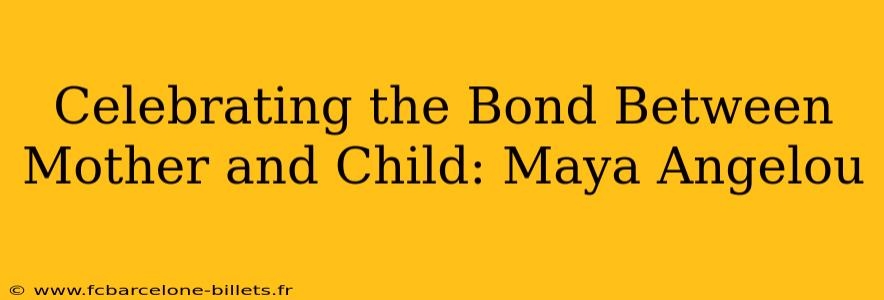Celebrating the Bond Between Mother and Child: Exploring Maya Angelou's Powerful Depiction
Maya Angelou, a literary icon, masterfully explored the complexities of the mother-child bond in her work. Her poems, essays, and autobiographies offer poignant insights into the enduring power of this relationship, revealing both its joys and its challenges. This exploration delves into Angelou's portrayal of motherhood, examining the multifaceted nature of this connection and its lasting impact on her life and writings. We'll also address some common questions surrounding Angelou's relationship with her mother, exploring her influence on the writer's life and work.
What was Maya Angelou's relationship with her mother like?
Maya Angelou's relationship with her mother, Vivian Baxter, was undeniably complex and marked by both love and distance. Separated early in Angelou's life, their bond was strained by circumstances beyond their control. Angelou's grandmother, Annie Henderson, played a significant role in raising her, creating a strong bond with a maternal figure different from her biological mother. While Angelou always acknowledged her mother's presence and influence, the distance and the challenges they faced undeniably shaped her perspectives on motherhood and familial relationships. This tension, this yearning for connection alongside a recognition of the realities of their situation, is a recurring theme throughout her work.
How did Maya Angelou's relationship with her mother influence her writing?
The complexities of her relationship with Vivian Baxter heavily informed Angelou's writing, providing a rich wellspring of inspiration and emotional depth. The themes of resilience, survival, and the enduring power of love in the face of adversity are prominently featured in many of her works, reflecting the emotional landscape of her early life. Her autobiographies, particularly I Know Why the Caged Bird Sings, offer unflinching honesty about the challenges she faced and the profound impact her mother had on shaping her identity. This raw vulnerability allows readers to connect deeply with her experiences and understand the lasting impact of parental relationships. She didn't shy away from portraying the imperfections of motherhood, demonstrating a nuanced understanding of the human experience.
What are some examples of Maya Angelou's work that highlight the mother-child bond?
Numerous pieces within Angelou's vast body of work explore the mother-child bond. I Know Why the Caged Bird Sings is arguably the most significant example. It meticulously chronicles her childhood experiences, highlighting the love, pain, and profound impact of her family dynamics. Beyond her autobiography, many of her poems subtly or explicitly touch upon themes of motherhood, often using powerful imagery and evocative language to capture the essence of this relationship. The recurring motif of birds, particularly caged birds, symbolizes both confinement and the ultimate longing for freedom – a metaphor that resonates deeply with the complexities of familial love and the search for identity.
Did Maya Angelou have children? How did motherhood influence her perspective?
Yes, Maya Angelou had one son, Guy Johnson. Becoming a mother profoundly shaped her perspective and undoubtedly added another layer to her understanding of motherhood's intricacies. While her own experience with her mother was fraught with challenges, her role as a parent provided her with firsthand insight into the joys, sacrifices, and unconditional love that define motherhood. This personal experience enriched her ability to portray the mother-child bond with depth and empathy, adding authenticity and nuance to her exploration of this universal theme.
How does Maya Angelou’s portrayal of motherhood differ from other literary depictions?
Angelou's portrayal of motherhood stands out due to its unflinching honesty and refusal to romanticize the relationship. She doesn't shy away from portraying the imperfections and challenges inherent in the mother-child bond. Unlike idealized depictions, her work presents a realistic and often raw portrayal of the complexities, showcasing the full spectrum of emotions – from love and joy to pain and disappointment. Her authenticity resonates with readers because it reflects the multifaceted nature of this powerful relationship as it truly exists in life. This makes her work exceptionally powerful and impactful, offering a nuanced perspective that expands our understanding of motherhood beyond simplistic narratives.
In conclusion, Maya Angelou's work provides a powerful and lasting exploration of the mother-child bond. Her unflinching honesty, combined with her lyrical prose and poetic imagery, offers a profound and nuanced perspective on a universal human experience. By exploring the complexities of her own relationship with her mother, she provides a lasting legacy that continues to resonate with readers worldwide.

